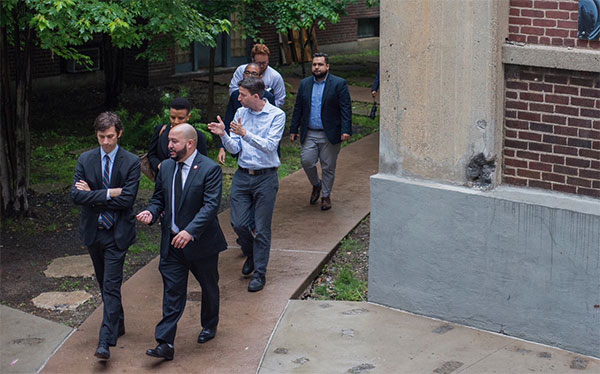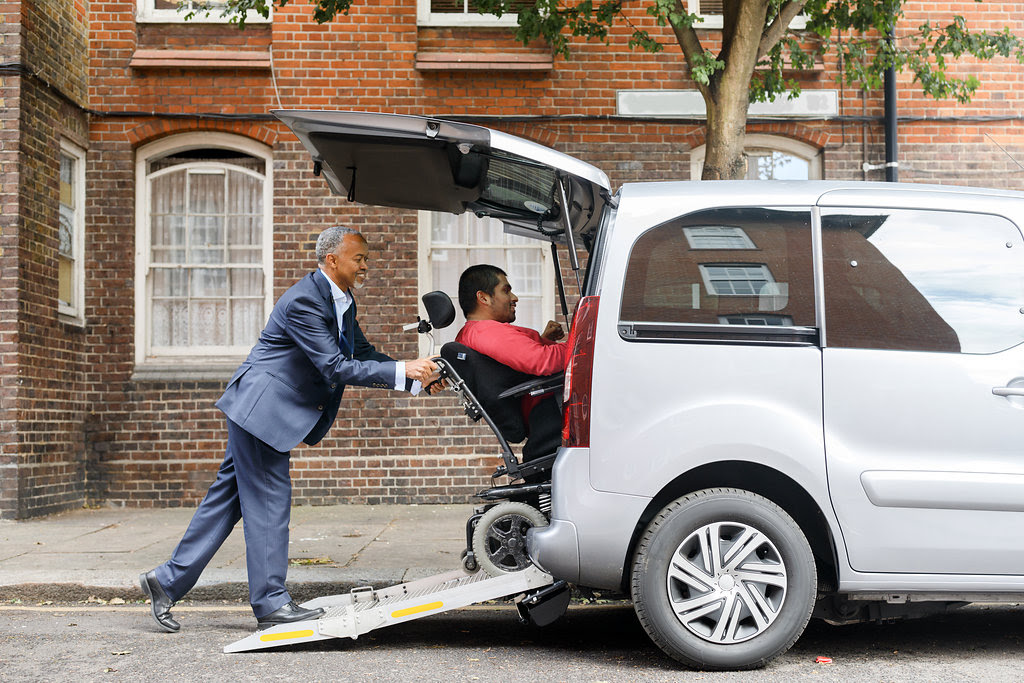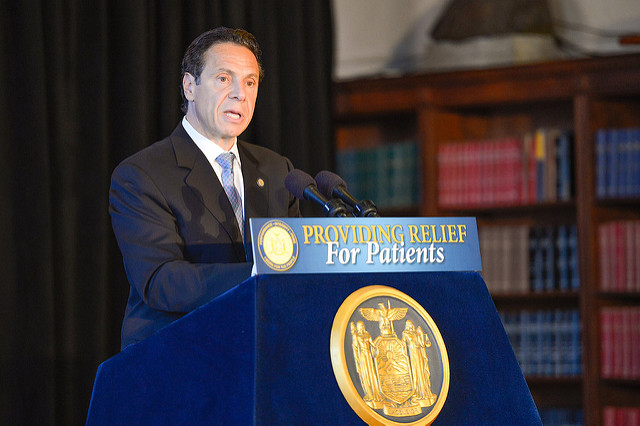A Supportive Housing Victory, and Much More To Do

Council Members Levin & Salamanca, the authors, foreground (photo: Jeff Reed)
New York City is facing a crisis. There are more than 60,000 homeless individuals living in the city shelter system daily, and thousands more in shelters for survivors of domestic violence, youth, and those living with HIV/AIDS. An additional estimated 4,000 New Yorkers sleep on the streets each night. And according to the Coalition for the Homeless, the number of homeless New Yorkers sleeping each night in municipal shelters is 83 percent higher than it was a decade ago.
These numbers are staggering. We, as elected leaders have a responsibility to do better and fully invest in solutions that work.
That is why, as moderators at this year’s New York State Supportive Housing Conference, we are proud to champion the city’s efforts to build more supportive housing -- a critical component of the City’s efforts to combat the homelessness crisis. We’re proud that the new city budget recently agreed upon by the Mayor and City Council, which we are members of, increased from 500 to 700 the supportive housing units that will become available in the next fiscal year. There is still much more to do.
Supportive housing is permanent affordable housing paired with wrap-around services designed to help people maintain their homes for the long-term. All tenants have a lease, and are provided with individualized on-site care, including case management, job training, and mental health and substance abuse counseling. Supportive housing developments are run by non-profit organizations that typically provide both support services and management.
Last year, the City Council General Welfare Committee held a hearing in The Schermerhorn, a supportive housing building that also contains affordable housing units for community members and artists, along with a theater for the public. It is a good example of how these developments create jobs and contribute to the growth and well-being of a neighborhood.
Supportive housing’s track record has shown its effectiveness in ending homelessness, and improving neighborhoods, creating much-needed affordable housing and saving taxpayer dollars. Simply put, it is housing for those most in need. Residents have a place to call home in an environment that provides direct case management and access to mental health providers. We know all too well how vital mental health care is to a person’s wellbeing, and is that much more critical for individuals who are unstably housed and have often faced significant trauma. The integrated service model enables people to connect to the programs that are right for them, helping them to lead their best lives.
Organizations like the Supportive Housing Network of New York, comprised of more than 200 nonprofit organizations, link the 50,000 units of supportive housing they’ve created with critical services and programs that give New Yorkers a jumpstart on advancing the lives they want to lead through a more holistic approach.
Supportive housing has made a world of difference to New Yorkers:
Like Robert, who struggled with mental illness and addiction most of his life, living in Madison Square Park for ten years. After a health emergency, Urban Pathways’ outreach team helped him move into a beautiful new apartment in his native Bronx. He’s an active participant in his building and in client advocacy groups, regularly visits with his mother and grandchildren, and is beloved by residents and staff alike.
And like Shannon, who has dealt with undiagnosed bipolar disorder and PTSD from a lifetime of sexual assault and domestic abuse. When she became a tenant at Community Access’ Gouverneur Court, things started to change: she fell in love with her current life partner, fellow resident Kenny, and overcame addiction with the support of the staff at Community Access. She now has full time work at the Social Security Administration and recently graduated with a master’s degree.
These stories show firsthand that supportive housing works. It’s why the Mayor proposed a plan in 2015 to build an additional 15,000 supportive housing apartments over 15 years through the city’s new NYC 15/15 program. We applaud the administration for this plan, yet we also know the need is immediate. We need to do more to bring units online today.
As Chairs of the City Council’s Land Use and General Welfare Committees, we’re working collaboratively with our fellow Council Members to help speed the creation of the Mayor’s promised 15,000 supportive apartments over the next several years so that all New Yorkers will have a place to call home.
We need a bold vision to end homelessness. Supportive housing is the key.
***
Stephen Levin represents the 33rd City Council District, including parts of Brooklyn, and Rafael Salamanca, Jr. represents the 17th District, including parts of the South Bronx. On Twitter @StephenLevin33 and @Salamancajr80.
***
Have an op-ed idea or submission for Gotham Gazette? Email This email address is being protected from spambots. You need JavaScript enabled to view it.
For-Hire Companies Must Make Rides Accessible to All

(photo via Uber)
They may claim to be “doing the right thing” in their splashy campaigns, but for-hire-vehicle companies like Uber and Lyft are in New York courts right now fighting fairness -- when it comes to serving the city’s 99,000 wheelchair users.
Whether you need to get to a job interview, a doctor’s appointment, or a dinner with friends, finding reliable and affordable transportation is a daily struggle if you use a wheelchair in New York City. The subway system -- with its tiny number of functioning elevators -- remains almost wholly inaccessible. Buses creep along, and the MTA’s paratransit system, Access-A-Ride, runs notoriously late and slow. The taxi industry offers a limited number of wheelchair-accessible vans with ramps (after years of litigation), and the number does not match the need. And in any case, cabs remain heavily concentrated in Manhattan and are extremely difficult to find in the outer-borough neighborhoods where many people with disabilities live.
One might think that the giant for-hire-vehicle (FHV) industry would look to fill this urgent transportation need, but only two of the major companies -- Uber and Lyft -- even claim to offer wheelchair-accessible vehicle (WAV) service, while Via, Juno, and Gett offer none at all.
But, 70 percent of the time the WAV services offered by Uber and Lyft failed even to locate a WAV during our testing last month for New York Lawyers for the Public Interest’s report “Left Behind,” in which we requested identical WAV and “regular,” non-WAV rides for the same time periods, at common locations such as JFK and LaGuardia airports, major medical centers, and Grand Central Station. To make matters worse, in the few instances when the smartphone platform apps did locate a WAV, the estimated wait time averaged four times as long as the wait time for inaccessible vehicles.
In response to this blatant equal rights violation perpetrated throughout the city’s massive fleet of 100,000 for-hire vehicles, the city’s Taxi and Limousine Commission (TLC) prepared a new rule requiring FHV operators, including “e-hail” operators such as Uber and Lyft, to incorporate a minimum number of WAVs into their fleets, starting with a minimal five percent this year, and increasing to a not-that-much-larger 25% percent by 2023.
But instead of taking this opportunity to serve the public fairly, as required by law, Uber, Lyft, and Via are fighting the new provision in court, claiming that it will inflict “economic damage” on the massive industry. Even worse, the large for-hire-vehicle companies are doubling down on their discriminatory practices – they are now pushing a bill in the state Legislature that would entirely override the TLC’s authority to mandate more accessible vehicles and effectively create a separate and unequal FHV service for people with disabilities.
Accompanying the mega-companies’ profit-driven objection is the unsubstantiated argument that individual drivers will not want to operate ramp-equipped wheelchair accessible vehicles, because they are more expensive to purchase and slower to operate. These arguments ring hollow. Uber, Lyft, and other FHV dispatch corporations are expert at offering an extensive menu of bonuses and incentives to drivers to ensure that there are ample drivers and vehicles available when and where the company wants them.
For example, Uber’s website touts perks like $800 in guaranteed income for new drivers, immediate same-day sessions for new drivers to help “fast track” the TLC licensing process, and a range of vehicle rental, lease, and financing options for drivers who don’t own vehicles. Plenty of FHV drivers choose to drive large, inefficient SUVs and luxury vehicles (to the detriment of our local air quality and traffic congestion) because the company offers them incentives to do so -- and plenty would opt to drive accessible vehicles equipped with wheelchair ramps, if offered the right incentives.
If these FHV e-hail corporations want to continue operating in our city (and clogging our streets with thousands of inaccessible vehicles), they should be required to harness their enormous resources to provide equal access to the thousands of New Yorkers with disabilities who most need their services.
***
Justin Wood is Director of Organizing and Strategic Research at New York Lawyers for the Public Interest (@NYLPI) and author of the “Left Behind” report.
***
Have an op-ed idea or submission for Gotham Gazette? Email This email address is being protected from spambots. You need JavaScript enabled to view it.
To Help New Yorkers Quit Opioids, Expand Access to Medical Marijuana Now

Gov. Cuomo at a med mar announcement (photo via the Governor's Office)
As a 67-year-old cancer survivor who suffers from chronic pain as a result of cancer treatments, medical marijuana has allowed me to resume a more normal life free of addictive opioid medications. I hope that lawmakers will now consider expanding the state’s medical marijuana program so that more New Yorkers will have the same access to these important treatments as an alternative to the powerful prescription painkillers that sparked the opioid crisis in our state.
My experience is all too typical of how so many people can easily find themselves reliant on prescription painkillers. Following my retirement from the U.S. Navy and a career in retail management, I was diagnosed with colorectal cancer in December 2015 and underwent chemotherapy, radiation therapy, and abdominal perineal resection surgery the following year. As a result of these treatments, I developed debilitating peripheral neuropathy and chronic lower spine pain and was unable to function normally.
The pain was constant and excruciating. My doctors prescribed oxycodone to manage my pain, and with no other options seemingly available, I was eventually taking Percocet pills every four hours or less.
But after researching New York State’s medical marijuana program, I finally had hope that an alternative to opiates was available to help treat my pain. I contacted my doctor and obtained my medical marijuana card in December 2017. Working closely with my doctor and the pharmacist at the dispensary in my community, we found the medical marijuana products that work best for me.
In just a few months, I was able to quit my oxycodone prescription and now live a more normal life — once again able to enjoy my retirement, children, and grandchildren. While my pain will never completely vanish, medical marijuana helps me manage the symptoms without fear of an opioid addiction that has claimed thousands of lives in New York in recent years. It has also been critical in helping to manage my Post Traumatic Stress Disorder (PTSD), which I developed following service in the Vietnam War.
But while I had a condition that made me eligible for the state’s medical marijuana program — and am fortunate to have a dispensary in my community that could help me quit oxycodone — thousands of New Yorkers still lack adequate access to medical marijuana and remain at the mercy of opioid-based prescriptions to manage their conditions.
Fortunately, there is hope for these patients in need of care. Recently proposed bills in the state Senate and Assembly would greatly expand access to medical marijuana for New Yorkers.
Senator George Amedore and Assembly Member Richard Gottfried have each introduced bills in their respective chambers that would allow doctors to prescribe medical marijuana to treat opioid addiction or as an alternative for those currently using prescription opiates — which could help prevent an addiction before it starts.
Separately, Assembly Member Gottfried and Senator Diane Savino have both proposed bills that would increase the number of potential dispensaries in New York from 40 to 250 by allowing medical marijuana companies to open up to 25 dispensaries each, bringing access to care for the many communities still in need throughout the state.
While these bills would undoubtedly help thousands of New Yorkers, they remain stuck in their respective committees with just days remaining in the current legislative session. Without action by lawmakers now, patients in need of medical marijuana care will be forced to wait even longer.
My experience is proof that medical marijuana is an important and meaningful alternative to prescription drugs for those suffering from chronic and painful conditions. I hope state lawmakers will support patients like myself by taking immediate action to pass these bills and give more New Yorkers hope for a life free of powerful and addictive opioid-based drugs.
***
Garry Croney is a resident of Newburgh.
***
Have an op-ed idea or submission for Gotham Gazette? Email This email address is being protected from spambots. You need JavaScript enabled to view it.




